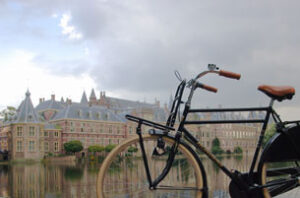Cycling safety and taking your bike on public transport
The Hague is one of the best cities in the world to cycle in. Almost every main street has dedicated cycle paths and there are numerous bicycle parking facilities as well as plenty of bicycles for hire.

It is often faster to travel around the city by bicycle than by car and you will not have to search for a parking space. Riding your bike is not only healthy but it is also a pollution-free mode of transport.
The Hague is also a relatively small city. Residents can reach most of their destinations in 20 minutes and cycling from one end of the city to the other takes around 45 minutes. The Hague has more than 370 kilometres of cycle paths and 70 kilometres of bicycle lanes and is constantly working to improve its vast network of cycle paths.
Cycling in a city can be scary for people new to the Netherlands. Once you have tried cycling in The Hague, you will soon see it is well-organised and quite straightforward.
Legal requirements
Bicycles should have lights affixed to it or worn on the cyclist’s chest or back. The bicycle should also be fitted with reflectors. When cycling in the dark or during times of poor visibility (including at dusk), bicycles must have their front and back lights on. Sometimes the police will set up road checks and will hand out a fine if you do not have your lights on. It is not compulsory to wear a helmet, but it is recommended.
Watch out for trams and tracks
Trams always have the right of way over everyone, unless road signs indicate otherwise. Avoid getting your bicycle wheel stuck in the tracks. Always approach the tram tracks at a wide angle and be aware the tracks may be slippery. Even cyclists who have lived here all their lives slip occasionally.
Reporting poor conditions
Have you come across a dangerous cycling situation in The Hague? For example, a poor surface or a dangerous intersection? Begin link: Report unsafe situations, end link. to the municipality. The Fietsersbond (Cyclists’ Union) and the municipality will then see what they can do about it.
Mobile phones
In the Netherlands you are not permitted to hold a telephone or other electronic device in your hand while riding a bicycle. You are allowed to listen to music and check your route while cycling only if you have a phone holder on your bike. And you may call hands free.
Also see Cycling guidelines for the Netherlands
There are no special cycling rules just for The Hague. International residents of the city should know the basic rules for cycling and road signs in the Netherlands. People have been fined for cycling on the pavements (sidewalks), for example. This is not allowed!
Right of way
Many intersections in The Hague have no signs or markings to indicate right of way. In general, all traffic coming from the right, including other cyclists, has right of way. Otherwise traffic must give way to vehicles crossing in front of them at the ‘Give Way’ sign or with the white, triangular ‘shark’s teeth’ markings on the road surface.
Drivers wishing to turn right should wait for cyclists to pass them (on their right) before they turn. Cyclists have priority here. However, not all drivers are aware of the cyclist-friendly rules. Therefore you should proceed with caution.
Beware at intersections
Be especially cautious at intersections with trucks and trams. Many trucks have been fitted with special side mirrors to boost the driver’s visibility. However, too many cyclists have been injured or killed when the cyclist enters the driver’s blind spot. The driver then does not see the cyclist when making a right turn.
More info GuideHolland.com
Children in the Netherlands learn to ride a bike at a very young age. They practice riding a bike with their parents or grandparents. Usually they do not enrol in cycling courses. Children are taught at school about traffic rules and road safety between the ages of 10 and 12 years. They are required to pass a cycling test. This is usually administered by the local police.
Many modes of public transportation allow you to take your bike along. However, some offer only a small window of opportunity for you to take a bicycle. Having a bicycle with you makes you mobile and flexible. It even allows you to travel to faraway places.
Trams and buses
Bicycles may be taken free of charge on the RandstadRail trams from Monday to Friday only after 19.00 hrs. and all day on the weekends. There are specially designated areas in the tram for bikes, indicated by a blue bicycle sticker. During especially busy times, it may be difficult to find space for a bicycle. The tram driver has the right to decide whether you may take your bicycle with you. No standard bicycles can be taken on the red-beige GTL trams, the R-net Avenio trams or buses. Folding bikes are considered carry-on luggage and can be taken on public transportation free of charge as long as they are folded before you enter the tram or bus. You must make sure they do not block the entrance or exit to the tram or bus.
More info can be found on the Begin external link: website of HTM(External link), end external link..
Trains
For information on taking your bicycle on the train in the Netherlands visit Begin external link: www.ns.nl(External link), end external link. and for an international journey visit Begin external link: www.nsinternational.com(External link), end external link..
